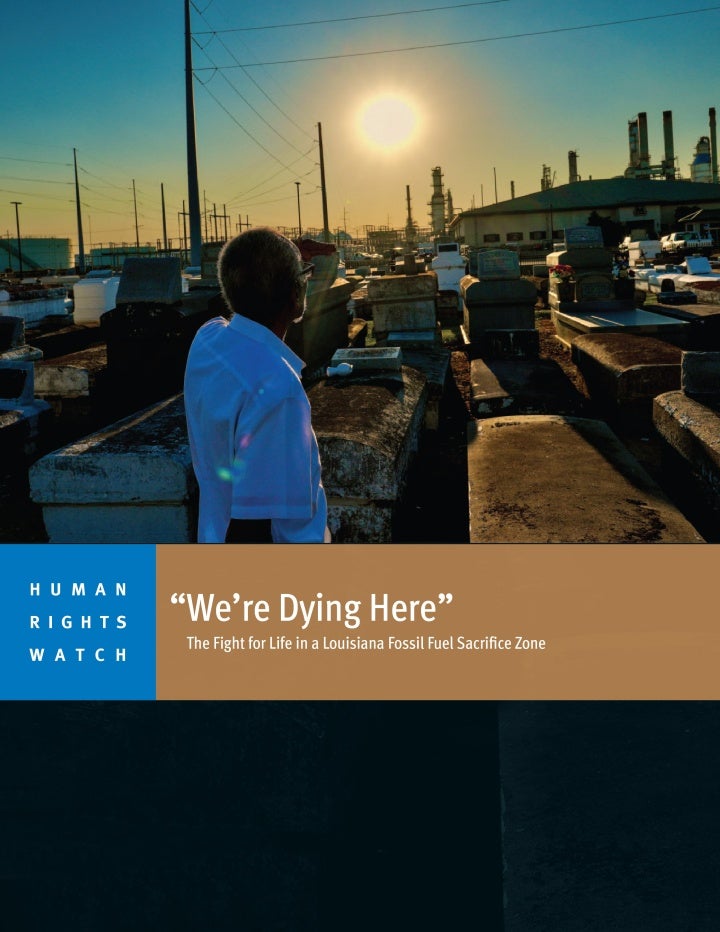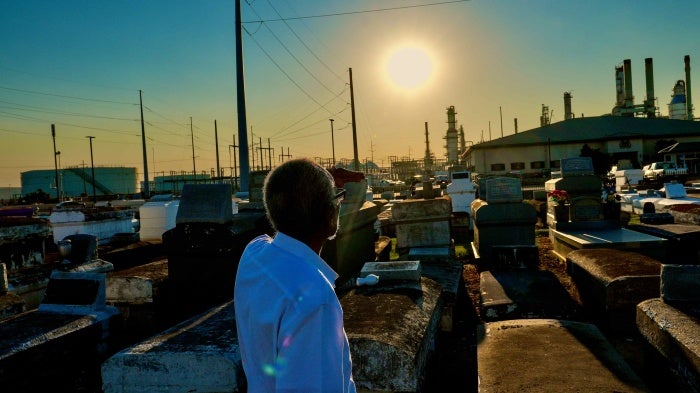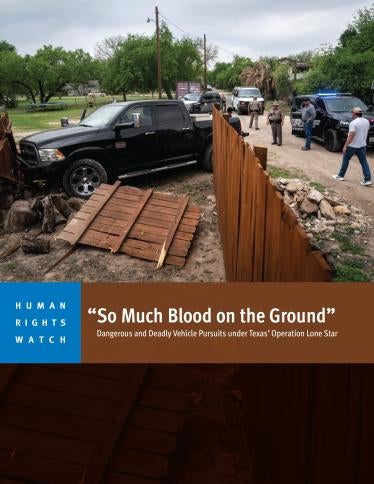



The 76-page report, “So Much Blood on the Ground: Dangerous and Deadly Vehicle Pursuits under Texas’ Operation Lone Star,” documents the spike in vehicle chases by Texas Department of Public Safety troopers and local law enforcement in the 60 most heavily affected Texas counties implementing Governor Greg Abbott’s Operation Lone Star program. Records reveal that in several counties, unnecessary vehicle chases have increased by over 1,000 percent since the program began. Human Rights Watch found that residents in these counties are disproportionately affected by law enforcement vehicle pursuits and crashes.


The 62-page report, “In Sheep’s Clothing: United States’ Poorly Regulated Nonprofit Hospitals Undermine Health Care Access,” describes how the US government’s lack of guidance and oversight allows privately operated tax-exempt hospitals to spend far less on making healthcare services accessible for people without the means to pay than the massive public subsidies they receive. In 2020, for example, nonprofit hospitals collectively received about $28 billion in tax benefits but only spent about $16 billion on free or reduced-price “charity care,” according to the Kaiser Family Foundation.
The 106-page report, “‘That’s When the Nightmare Started:’ UK and US Forced Displacement of the Chagossians and Ongoing Colonial Crimes,” documents the treatment of the Chagossians, an Indigenous people whom the UK and US forced from their homes in the 1960s and 1970s so that a US military base could be built on Diego Garcia, the largest of the islands. The UK, with US support, has prevented the Chagossians from returning home. Even though the UK and Mauritius surprisingly announced negotiations on the future of Chagos in November 2022, there has been no clear commitment to meaningful consultation with the Chagossians and to guarantee their right to reparations, including their right to return, in any settlement.
The 39-page report, “Access Denied: How Florida Judges Obstruct Young People’s Ability to Obtain Abortion Care,” documents how in Florida many judges deny young people’s petitions, forcing them to continue a pregnancy against their wishes, travel outside the state, or seek a way to manage abortion outside the health system. Judges have the power to make highly subjective determinations about a young person’s maturity and interests. Vague criteria in state law enable highly arbitrary decision-making, with judges making decisions based on factors such as the young person’s grades and impressions of their demeanor during a nerve-wracking hearing.
The 147-page report, “‘If I Wasn’t Poor, I Wouldn’t Be Unfit’: The Family Separation Crisis in the US Child Welfare System,” documents how conditions of poverty, such as a family’s struggle to pay rent or maintain housing, are misconstrued as neglect, and interpreted as evidence of an inability and lack of fitness to parent. Human Rights Watch and the ACLU found significant racial and socioeconomic disparities in child welfare involvement. Black children are almost twice as likely to experience investigations as white children and more likely to be separated from their families.
The 63-page report, “‘We Deserve to Have a Place to Live:’ How US Underfunding Public Housing Harms Rights in New York, New Mexico, and Beyond,” examines the impact of a decline in federal funding for public housing, which has been accompanied by a modest increase in investment in affordable housing programs that rely on the private sector, such as voucher and subsidy programs. Human Rights Watch found that budget cuts have led to deteriorating living conditions in public housing in New York City, as well as in northern New Mexico, and have reduced the public housing stock nationwide. It also finds that other affordable housing programs, which rely on the private sector, have often failed to guarantee long-term affordability for people with the lowest incomes.
The United Nations Committee on the Elimination of Racial Discrimination should direct the United States government to take immediate, tangible measures to dismantle structural racism in the United States, Human Rights Watch and the American Civil Liberties Union said today, releasing a joint report to the committee.
The 92-page report, “‘If I’m Out of Insulin, I’m Going to Die:’ United States’ Lack of Regulation Fuels Crisis of Unaffordable Insulin,” describes the human rights impacts of US government policies that make essential life-saving medication like insulin unaffordable for many people. Human Rights Watch found that exorbitant insulin prices and inadequate health insurance coverage can cause people to pay high out-of-pocket costs for insulin, contributing to dangerous and potentially lethal medicine rationing, forcing people to forgo other basic needs, and disproportionately affecting socially and economically marginalized groups.
The 149-page report, “‘How Can You Throw Us Back?’: Asylum Seekers Abused in the US and Deported to Harm in Cameroon,” traces what happened to the estimated 80 to 90 Cameroonians deported from the United States on two flights in October and November 2020, and others deported in 2021 and 2019. People returned to Cameroon faced arbitrary arrest and detention; enforced disappearances; torture, rape, and other violence; extortion; unfair prosecutions; confiscation of their national IDs; harassment; and abuses against their relatives. Many also reported experiencing excessive force, medical neglect, and other mistreatment in Immigration and Customs Enforcement (ICE) custody in the US.
The 98-page report “The Tenant Never Wins: Private Takeover of Public Housing Puts Rights at Risk in New York City” examines the impact of the New York City Housing Authority (NYCHA) program called Permanent Affordability Commitment Together (PACT), which utilizes a federal program called the Rental Assistance Demonstration (RAD) to permit the privatization of some housing. Under PACT, which began in December 2016, NYCHA leases its public housing developments to private companies for 99 years and privatizes the buildings’ management. Human Rights Watch found that PACT conversions also mean the loss of key protections for residents, and, in two developments, may have contributed to increased evictions.
The 82-page report, “‘We Need Access’: Ending Preventable Deaths from Cervical Cancer in Rural Georgia” documents how state and federal policies neglect the reproductive healthcare needs of rural Black women. Cervical cancer is highly preventable and treatable. In 2020, 194 countries committed to ending cervical cancer globally, the first such commitment made for a cancer. While cervical cancer mortality rates have declined in Georgia over recent decades, they are still high and racial disparities persist.
The 65-page report, “‘I Just Try to Make It Home Safe’ Violence and the Human Rights of Transgender People in the United States,” documents how persistent marginalization puts transgender people, particularly Black transgender women, at heightened risk of violence at the hands of strangers, partners, family members, and law enforcement.
The 94-page report “Dismantling Detention: International Alternatives to Detaining Immigrants,” examines alternatives to detention in six countries: Bulgaria, Cyprus, Spain, the United Kingdom, Canada, and the United States. Human Rights Watch found that alternatives to detention such as case management services, can effectively address government interests in immigration enforcement while protecting migrants’ rights and often offering a range of other benefits.